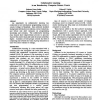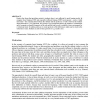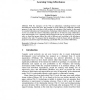594 search results - page 13 / 119 » A Simulated Student Can Improve Collaborative Learning |
SIGCSE
1994
ACM
13 years 11 months ago
1994
ACM
An experiment in collaborative learning was conducted in two introductory programming courses at Loyola College in Maryland. Data collected included background information on stud...
ETS
2000
IEEE
13 years 7 months ago
2000
IEEE
Practice has shown that providing content to students alone is not sufficient for good learning results. In computer based training (CBT) and especially webbased training (WBT) en...
ICALT
2010
IEEE
13 years 8 months ago
2010
IEEE
A nationwide sample of university students completed a survey that asked questions about their perceptions of the factors that can cause problems which exist with online or general...
JUCS
2011
12 years 10 months ago
2011
: With the emergence of the Web 2.0 phenomena, technology-assisted social networking has become the norm. The potential of social software for collaborative learning purposes is cl...
AIED
2009
Springer
14 years 1 months ago
2009
Springer
This study shows that affect-adaptive computer tutoring can significantly improve performance on learning efficiency and user satisfaction. We compare two different student uncer...



